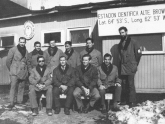Access the channel
Argentina celebrates the 70th anniversary of the Argentine Antarctic Institute (IAA), the first scientific body created exclusively for the development of Antarctic science in all its aspects.
The IAA was founded on April 17, 1951 by decree 7338/51 of President Juan Domingo Perón, with the purpose of “continuing to ensure in an inalienable way for the Argentine Nation the historical, geographical and territorial rights that assist it over the Argentine Antarctic Sector”, under the inspiration of General Hernán Pujato, who was its founder and first Director.
Among the various activities that the IAA has carried out in recent times in cooperation with the biotechnology company Biosidus, it was responsible for the sequencing of the first complete genome of a microorganism carried out in the country, that of the Antarctic bacterium Bizionia argentinensis, classified as a new species in 2008.
In addition, it is worth mentioning the monitoring of the seismic activity that has been manifesting from August 2020 to present in the Mar de la Flota (Fleet Sea) mainly due to the activity of the Orca Seamount and the monitoring of the break-up of the giant iceberg A68a, which originally covered an area of nearly 5,800 square kilometres (more than 28 times the area of the Autonomous City of Buenos Aires). It is also worth noting the progress made in the joint proposal with Chile to create a Marine Protected Area in the Western Antarctic Peninsula and Southern Scotia Arc.
This institution, pioneering in the development of Antarctic scientific research, has its headquarters in the Miguelete campus of the National University of San Martín and depends on the National Directorate of the Antarctic, under the orbit of the Secretariat of Malvinas, Antarctica and South Atlantic of the Argentine Ministry of Foreign Affairs.
The Secretary of Malvinas, Antarctica and South Atlantic of the Argentine Ministry of Foreign Affairs, Daniel Filmus, celebrated the anniversary and highlighted “the fundamental role of the Argentine Antarctic Institute, which since its creation has held a strategic perspective on the white continent”.
“We are proud of the enormous scientific work that, without interruption, is developed by the IAA in the Argentine Antarctic. It is a national institution committed to sovereignty, international cooperation, peace and the protection of the environment”, he said. “We congratulate all IAA staff for their work and effort, continuing the legacy of Colonel Pujato”, concluded Filmus.
Currently, the IAA is composed of approximately 56 researchers specialized in different scientific disciplines, who together coordinate and develop the different scientific projects and have generated approximately 500 scientific articles in the last decade. In addition to the researchers, there is technical and administrative staff that constitute an essential support in the tasks of the institution.
Scientific activity is the guiding axis of Argentina's activity in Antarctica and all means and resources are oriented towards permanent support for this purpose, contributing substantially to our sovereignty in the Argentine Antarctic Sector and under a firm commitment to the international scientific cooperation within the framework of the Antarctic Treaty, signed by our country in 1959.
The scientific production of the IAA comes, to a large extent, from the research carried out at the Carlini Base (25 de Mayo Island, South Shetland Islands) and in the camps that are set up each summer in the areas near the Marambio Base, located at the east of the Antarctic Peninsula. Research is also carried out in the other four permanent bases (Orcadas, Esperanza, San Martín and Belgrano II) and in the seven temporary bases, which only have activity during the Antarctic summer.
The IAA conducts research in many different scientific disciplines, such as biology, geology, physics, chemistry, oceanography, atmospheric sciences, social sciences, and many others. Among them, it addresses as a priority those studies that tend to analyze the manifestations of climate change and its effects on the Antarctic environment, as well as studies related to the conservation of the Antarctic environment and actions for its remediation. Studies on the upper atmosphere are also a priority, especially those related to the ozone layer depletion and its effects on the environment.
Given the enormous reservoir of biodiversity that Antarctica represents and the importance of its conservation, it is critical for Argentina to undertake its detailed study. This includes not only the identification and study of the organisms that inhabit the continent, but also genetic diversity.
The IAA also prioritizes studies on the connections between Antarctica and the Argentine South American territory, aimed at unveiling the intimate biogeographic relationships between both regions, not only in the present but also of the geological past. Moreover, it is in the IAA's interest to promote the advancement of scientific studies in the different areas of Antarctic oceanography, in line with the Decade of Ocean Science that begins in the year 2021.
In addition, the IAA contributes substantially to the leading role of our country in the forums of the Antarctic Treaty System and other intergovernmental Antarctic forums, providing scientific advice to the Argentine delegations coordinated by the Ministry of Foreign Affairs and actively participating at the international level in the Scientific Committee on Antarctic Research (SCAR).
It also participates in dissemination activities in very diverse formats and with increasing participation in social networks, in order to disseminate its results, raise the population awareness about the importance of Antarctic science and promote Antarctic vocations among the young people of our country.
The growth of this pioneering institution, which is celebrating its first 70 years, is essential to safeguard our sovereignty in Antarctica, as well as to maintain the preponderant role that our country plays within international Antarctic science.
Further information about the IAA: https://www.cancilleria.gob.ar/es/iniciativas/dna/instituto-antartico-argentino/


